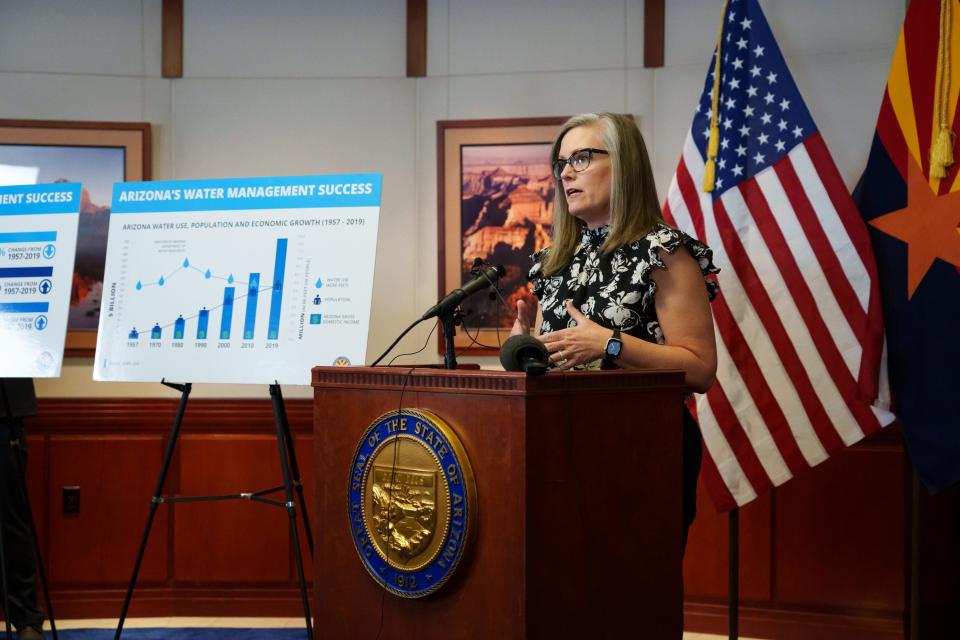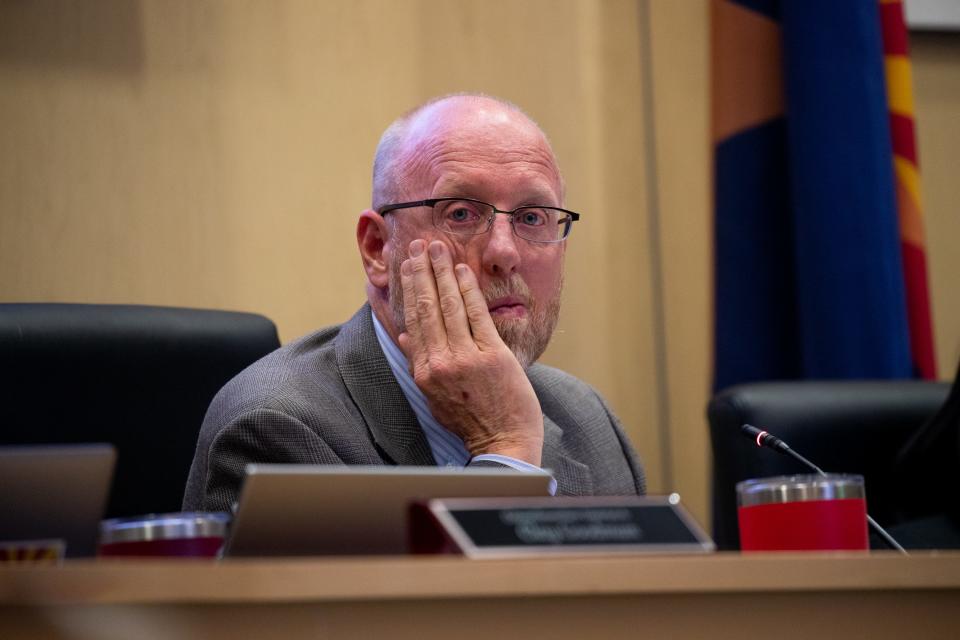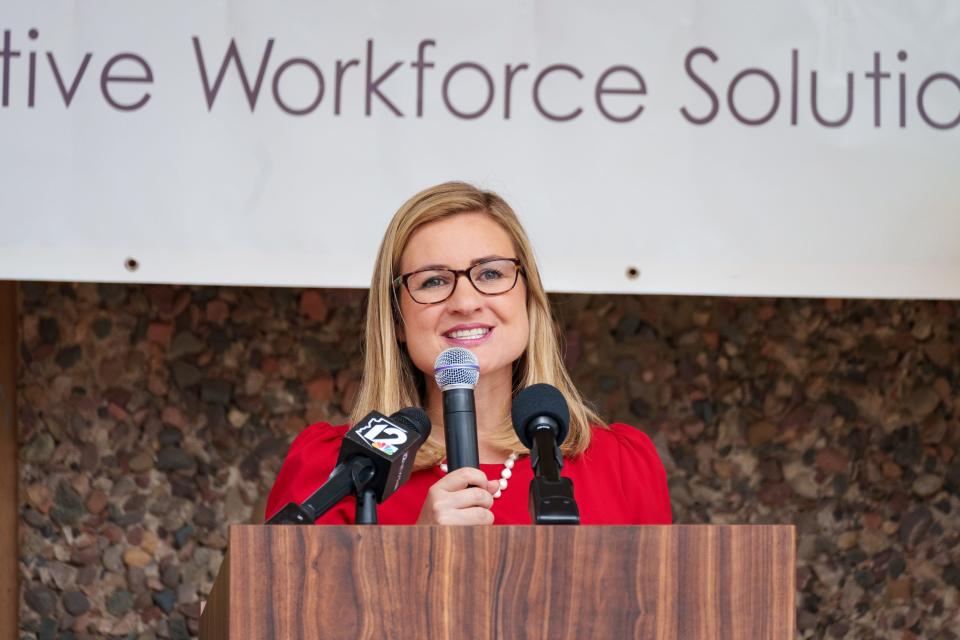Buckeye, Queen Creek officials try to calm public after Arizona limits new home construction
City officials in fast-growing Queen Creek and Buckeye downplayed concerns about water needed for future growth after news broke that the state's water agency would stop approving new home developments that rely solely on groundwater.
That's a showstopper announcement, especially for such cities on the outer edges of the greater Phoenix metropolitan area. Home construction is a booming part of their local economies and critical to housing a surging population, in some of the fastest-growing communities in the nation.
Buckeye and Queen Creek lean heavily on new development for their economic health but also rely heavily on groundwater.

On Thursday, Gov. Katie Hobbs' announcement that groundwater supplies are short of what's necessary to serve existing commitments for the next 100 years made national headlines, raising worries about the viability of the region. Zillow, the national housing technology company, issued a formal statement.
The news could deepen the state's housing shortage and affordability problems. It could deter, rightly or wrongly, prospective out-of-state employers from coming to the Valley if they believe the area is unsustainable or that enough housing won't be available to accommodate their workforce.
Elected leaders, city officials, water experts and housing industry representatives reacted with mixed emotions, ranging from excitement, frustration and caution.
Groundwater rights: Fast-growing Buckeye's land, water rights deal still not enough to quench need
Buckeye Mayor Eric Orsborn and a spokesperson for Queen Creek emphasized that water was available for existing customers and downplayed the effect of stopping new home development.
Orsborn said, "There isn't anything to worry about when it comes to water with current residents and current businesses here in the city."

A spokesperson for Queen Creek said, "The announcement impacts a small number of undeveloped properties in Queen Creek that do not have an assured water supply — those properties must find a renewable source of water before they can develop."
Spencer Kamps, of the Home Builders Association of Central Arizona, said the restriction on new home development would worsen housing affordability and could harm the state's ability to attract employers.
"As we've expanded our manufacturing base ... those employees who are going to work for this company need a place to live. We need to resolve this issue so Arizona can grow," Kamps said.
That could spell trouble for outlying Valley areas, most notably Queen Creek and Buckeye, which have become something of a hotbed for the state's growing technology sector in recent years.
Battery factory in Queen Creek: Korean battery giant LG announces huge expansion plans
Queen Creek utility director Paul Gardner sought to distinguish his town's plight from Buckeye's, noting how the construction restriction, while serious, applies to a much smaller portion of land than in Buckeye.
Queen Creek, which is 70 square miles and about 70% built-out currently, has water certificates for 92% of its land, Gardner said. Buckeye, meanwhile, is 640 square miles and 13% built out, according to Annie DeChance, spokesperson for the city.
The groundwater problem is less pronounced in older and more established cities with 100-year water designations from the state.
The designations are essentially a green light by the Arizona Department of Water Resources that the area has guaranteed water to serve customers for 100 years, including home subdivisions.

In Phoenix, Mayor Kate Gallego also sought to assuage concerns, writing on Twitter, "Rest assured, the city ... is prepared."
Phoenix, like other big cities such as Mesa and Scottsdale, relies more heavily on river and reclaimed water than groundwater to serve customers and therefore won't be directly affected by the construction limitation. Twelve Arizona cities and towns, including Tempe, Glendale, Chandler, Goodyear and Surprise, have 100-year designations and will also not be as directly affected.
Buckeye and Queen Creek, as well as Carefree in the north Valley, do not have designations, which forces housing developers to seek independent certifications of 100-year supplies from the state water agency.
Despite the less consequential impact on Phoenix, city water advisor Cynthia Campbell said, "I think it would be disingenuous to say, 'No. This doesn't have any impact on us.'"
"We're now at the point where people call up and say, 'Should I move there? Are you guys running out of water?" Campbell said. "But it's a perception issue, not a factual issue."
Water advocates and experts who had been sounding the alarm bells for years, meanwhile, were more optimistic about the announcement, expressing a sense of relief that the action was being taken to keep Arizona's groundwater from being fully depleted.
"We have to live within our means," Kathleen Ferris, senior research fellow at the Kyl Center for Water Policy and a former state Water Department director, said.
Ferris believes Thursday's announcement will put renewed focus on water conservation, both by the public and government. It may also begin to curtail the Valley's urban sprawl, leading to more infill development that builds inward, not outward, Ferris said. Infill would likely mean more density and upward development.
What's status of Arizona's water future? Here are 7 things we know
Housing construction provides a revenue stream to cities through construction sales tax, impact fees and permitting costs. It's also not uncommon for large master-planned communities, like many in Buckeye, to provide the city additional funds for certain community needs or wants.
According to Buckeye's most recent annual finance report, "Housing construction has been the primary source of the City’s revenues over the past several years." Construction accounted for nearly $26 million of the total $62 million in excise taxes, or 41%, collected in Buckeye in 2022, according to the report.
Restrictions on new construction will not affect houses already approved for development by the state water agency. That applies to approximately 80,000 new units, according to Hobbs, which means impacts to city finances would likely be felt more in the long term, not immediate, future.
Buckeye's mayor, however, said he's not concerned because the city is seeking new sources of renewable water to balance the water portfolio. Orsborn said he also anticipates that more stakeholders will want to be a part of the solution to find more water for Buckeye.
Solutions might include expanding the Bartlett Dam, Orsborn said. Nearly every municipality in the Valley is helping to fund the Bureau of Reclamation to investigate the possibility of adding height to the dam to enable more water storage behind it. The project would nearly double the storage capacity on the Verde River, making the reservoir northeast of Fountain Hills able to hold about 350,000 additional acre-feet of water.
The dam, however, is a long-term solution. And quicker fixes are hindered by high cost and competition amongst most all municipalities in the arid Southwest looking for more water.
The situation is similar in Queen Creek. The city was recently able to reduce its reliance on groundwater from 70% to approximately 50% by acquiring more renewable sources, town spokesperson Constance Wilson said, but it's recently jumped back up.
Queen Creek, like other Valley cities, is voluntarily leaving its allocation of Colorado River water in Lake Mead. It's part of a multi-state agreement by lower basin states that rely on the river to combat drought and dangerously low levels in the reservoir. The town will receive about $1.2 million in compensation, Gardner said, which it will spend on three facilities to recharge water back into the ground.
The pressure on both the Colorado River and groundwater supplies could inspire interest from more Valley cities in advanced water purification technology, which cleans wastewater to drinking water standards and essentially adds a new, renewable source of water to cities' portfolios.
Phoenix, in April, announced plans to build an advanced purification plant that would provide water for 200,000 households a year. The city wants to share the water with other cities that chip in. Gardner said Queen Creek was very interested but would need to sort out the logistics since the facility will be located far from the town.
For Buckeye, Thursday's announcement came several months after Hobbs previously released a report by ADWR that stated some developments in the West Valley would need to find additional water sources because the Hassayampa sub-basin doesn't have as much water as was previously thought. ADWR said it would no longer issue certificates to developers relying on the Hassayampa sub-basin, which is located west of the White Tanks and Buckeye.
The city can still rely on other sources of groundwater located outside such as the Harquahala sub-basin because it exists outside of the Phoenix Active Management Area, where ADWR regulates groundwater. Buckeye purchased land with groundwater rights to that sub-basin earlier this year for $80 million.
Queen Creek Mayor Julia Wheatley declined to comment. Carefree officials did not respond to request for comment from The Arizona Republic.
Reporters Taylor Seely and Alex Hardle cover Phoenix and Buckeye for The Arizona Republic.
Reach Taylor Seely at tseely@arizonarepublic.com or by phone at 480-476-6116.
Reach Alex Hardle at ahardle@gannett.com. Follow her on Twitter @AlexandraHardle.
This article originally appeared on Arizona Republic: Officials react to Arizona water agency limiting new home builds

